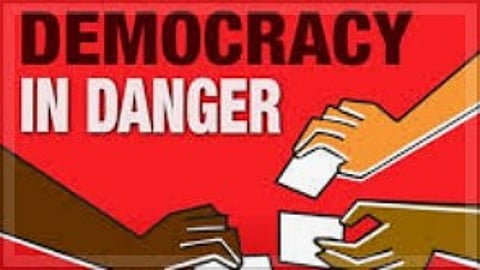

The essence of democracy lies in its checks and balances, where the ruling government and Opposition parties work together to uphold the values of freedom, equality, and fraternity. The Opposition, far from being a mere constitutional necessity, is an indispensable force that ensures accountability and transparency in governance. However, this vital institution seems to be faltering in our democratic framework, with grave implications for the health of our nation.
In theory, democracy thrives on debate and dissent. The Opposition plays a crucial role in scrutinising government policies, advocating for the marginalised, and safeguarding the Constitution’s principles. Yet, the current political landscape raises a pressing question: are our representatives, both in the ruling party and the opposition, genuinely fulfilling their constitutional duties? The answer, alarmingly, is no.
A disturbing trend has emerged where candidates campaign vehemently against the ruling party, decrying corruption and authoritarianism, only to defect to the very establishment they once opposed after securing electoral victories. This blatant betrayal of voters is compounded by the normalisation of electoral malpractices, such as vote-buying. While not all voters succumb to these unethical tactics, the repeated treachery of leaders who switch allegiances undermines the integrity of democracy and devalues the votes of honest citizens.
Equally concerning is the apathy of the general public. Law-abiding and progressive citizens, who form the backbone of a vibrant democracy, often remain passive spectators to this erosion of democratic values. Their silence, whether borne of disillusionment or fear of reprisal, leaves space for corruption and malfeasance to flourish unchecked.
A case in point is Goa, where Opposition parties have raised voices against glaring instances of corruption, such as government job scams and illegal land conversions. However, these efforts have largely been met with indifference from the public, stemming from a pervasive distrust of political actors. On occasions when an Opposition leader genuinely champions public grievances, they are frequently silenced through coercion or the brute force of political majorities.
The judiciary, often seen as recourse for justice, is inundated with unresolved cases. From financial scams involving senior citizens to police misconduct, the refrain remains the same: “The matter is in court.” While some social organisations and activists persist in their fight against such injustices, their efforts alone cannot compensate for a dysfunctional democratic system.
The state of Opposition parties in Goa reflects a broader national malaise. The Congress, traditionally a key opposition force, has been significantly weakened by defections, with eight MLAs recently joining the ruling BJP. Despite this setback, the party has shown little initiative to rebuild its organisational strength. Meanwhile, relations between the Congress and the Aam Aadmi Party (AAP) have soured, further fracturing the opposition landscape.
As the BJP prepares for the 2027 elections with a head start, boasting that half its groundwork is already complete, Opposition parties appear uncoordinated and unprepared. The electorate’s anger at governance failures is palpable, yet Opposition leaders seem unable—or unwilling—to channel this discontent into a cohesive strategy.
It is undeniable that a strong majority enables governments to make decisive policy decisions. However, history warns us of the dangers of unchecked power. British historian Lord Acton’s timeless observation that “Power tends to corrupt, and absolute power corrupts absolutely” rings true today. Without an effective Opposition to hold rulers accountable, the democratic framework risks being dismantled from within.
To revive democracy, the Opposition must rise to the occasion. This involves not only uniting across ideological and organisational divides, but also restoring public trust through principled leadership and meaningful action. The Opposition, media, Judiciary, and civil society must collectively work to protect democratic values, ensuring that power is never concentrated to the detriment of the people. Only then can we hope to build a nation where democracy is not merely a ritual of elections but a living, breathing testament to the will of the people.